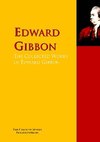Loe raamatut: «Private Letters of Edward Gibbon (1753-1794) Volume 1 (of 2)», lehekülg 21
232.
To J. B. Holroyd, Esq
Bentinck Street, December 20th, 1774.
Hear, but be silent especially to Mrs. G. —The Gout has attacked my left foot, and that Imperious Mistress, if I presumed without her permission to dispose of myself – However, she seems inclined to pardon and to leave me. In that case poor Clarke is my next difficulty; without a hope of recovery he may linger longer, than some days ago I thought was possible. Should I find myself at liberty, I have engaged myself to visit the Widow the first week in January; ten days from that date will lead me to the meeting of Parliament, an awful meeting indeed! You will receive with this the resolutions of the American Congress.274 I shall certainly be in town (if your impatience soon drives you from Bath) to house you and My Lady in your passage. Deyverdun is not averse to go to S. P. when I go to Up-park.
E. G.
233.
To J. B. Holroyd, Esq
Dec. 24th, 1774.
I do not upon the whole like your Sackville Street plan. At least I should not like it, were it not for an unlucky guest I have got in the house. I do not mean my Gout, for that is on the wing, but a bad kind of small-pox which has attacked one of my Virgins in the Garret.
DEEP IN AMERICA.
I am deep in America with Maudit, passed four hours with him yesterday, and I shall dine and spend the day tête-à-tête with him next Monday. He squeaks out a great deal of sense and knowledge, though after all I mean to think, perhaps to speak, for myself. I likewise (at his house) conversed with Governor Hutchinson,275 with whom I mean to get acquainted.
Tremlett I will try to see in May, but his book is not worth the 18 pence he gave for it. I mean barring the good Spanish. That Spanish is in truth the original, composed by one Miguel de Luna in the sixteenth century, as a pretended translation from an imaginary Arabic Manuscript of General Tarikh.276 The History is a Romance mixed up with gross improbabilities and anachronisms. Adieu. Young Cooke277 of Turin dined with me to-day. I thought it a civility to Denham, though I believe only half the house will thank me for it. He is a very fine Gentleman. Adieu. I salute My Lady. Do you salute Madame ma Mère, Sunday morning, tell her that I am sorry for her Rheumatism, have taken care of the Lees, and will epistolize her Monday or Tuesday.
À propos – I thought of the Arabic MS., but had almost forgot to tell you that Gilbert of Lewes was with me this morning. He has discovered the owner of the Tythes, an Attorney – Mr. Charles Down of Hythe, where he is at present, but who lives in town.
I fear to put the Saint to any expence, and remembered what you said of negotiating in person. Therefore agreed that when Gilbert comes to London next month, we would see Down together; in the interim – silence. But if you think not a moment should be lost, I can by a line despatch Gilbert to Hythe.
Again – Adieu.
234.
To his Stepmother
Bentinck Street, Dec. 28th, 1774.
Dear Madam,
My poor friend died last Monday, and has left me – together with Mr. Skipwith – his Executors and Trustees, a very painful and perhaps thankless office. You will easily suppose that the shock, however expected, and the hurry of melancholy business, have swallowed up the remembrance of any lesser disappointment, and indeed engross all my thoughts. The Holroyds dine with me to-morrow. – You will be so kind as to excuse the Christmas draught for a week or ten days at farthest.
I am, Dear Madam,Most truly yours, E. G.
235.
To J. B. Holroyd, Esq
B. S., Thursday Evening, January 5th, 1775.
DEATH OF GODFREY CLARKE.
Winton has submitted,
His whole rent is remitted.
But what is to become of you and My Lady? are you both swallowed up in the Sussex roads? Deyverdun desires to be remembered. A letter of business from his Lord M[iddleton], which he daily expects, still detains him in town. Give him a line about your motions and tell him when you may be ready to receive him. I say to him, rather than to me, because I lie Saturday night at Twickenham and dine on Sunday with the Widow. The 17th (Tuesday se'nnight) I shall be in Bentinck Street again, as our Parliamentary Campaign opens on Thursday. Adieu. I write with severall people in the room, and am called away to a Chess party. Will Maria excuse my silence? but she should early be taught that men retreat, when young Ladies advance.
I have had two very long days with Skipwith on poor Clarke's affairs; they are indeed in a very distressed condition, and reckoning the brother and sister's fortunes, £100,000 will hardly clear them, but the means are large, my colleague indefatigable, and it is the only office of friendship now left in my power. I could only wish that our authority was less circumscribed.
On re-reading Sir Hugh's letter, which I had not yet done, I find that after Winton's brother arrived they went to Petersfield, consulted with another Lawyer, and when they had shamefully and scandalously abused Andrews, paid the money and gave up everything, Straw demand, &c. They think no more of law, but will pay their rent quarterly into my own hands only. Cannot I refuse it (it will be disagreeable), and oblige them to pay it on the spot to any person I shall empower?
236.
To his Stepmother
Bentinck Street, January 7th, 1775.
Dear Madam,
After the loss of my poor friend, I begin to be a little relieved from the load of business and anxiety which his confidence has devolved upon me in conjunction with Mr. Skipwith, and with assistance the affairs of poor Clarke will soon be brought into a regular method, which in time may enable us to discharge our trust and to deliver a very noble Estate from a very heavy incumbrance of debt. I now propose to spend the ten days that remain before the meeting of Parliament,278 at Up-park. The change of air will not I fancy do me any harm either in mind or body; I mention the latter, as I find Sir Stanier betrayed me. The Gout has now asserted his rights in an unquestionable manner, but on this occasion he has exercised them in a very gentle manner, and I can say with truth, that I find myself rather benefitted than injured by his transient visit. I hope you may be able to send me as good an account of the Rheumatism.
The Willow Garland you sent me has not much disconcerted my Philosophy, and indeed the sanctity of the Lady, had a little prepared me for, and reconciled me to, the disappointment. I am only sorry that the ill-success of a negociation conducted with so much ability and of so promising an appearance should have given you a disgust for the honourable profession of Ambassadress. On the contrary, I should hope that in the well-furnished market we might, either now or hereafter, find the opportunity of retrieving our first miscarriage.
Sir Stanier and Lady Porten exhibit a very pretty picture of conjugal fondness and felicity, and yet they have been married very near three weeks.
I have now, dear Madam, sent you the Christmas Draught, and hope the short delay has not been attended with the least inconveniency to you. It was occasioned by the obstinacy of Winton, who obliged me to distress for rent. Hugonin obeyed very spirited orders with skill and alacrity, and the well-timed chastisement has rendered the Brute perfectly tame and submissive. His character indeed is of much less consequence to me than his substance, which is of a very responsible nature. Excuse me for dwelling a moment on so trifling and disagreeable a subject.
I am, Dear Madam,Most truly yours,E. Gibbon.
I set out about twelve o'clock, take a dinner and bed with the Cambridges and dine to-morrow at Up-park.
237.
To J. B. Holroyd, Esq
18th January, 1775.
I received at Up-park your long expected rescript. Yesterday I returned to town. Our party was numerous. Lady F. proposed to have her brothers,279 Sir Thomas and Lady Miller, &c. But so uncertain are human affairs that accidents disapointed her. In their room we had the fox-hunting friends of Sir Harry. Lord Egremont, who is civil and sensible; General Pitt with his wife, a determined Sportsman (I mean Sportswoman) who hunted all the morning and slept all the evening. On my return I slept with Hugonin. He was lamentable, as you may suppose, about Winton's repairs, &c. Yet I am satisfied Winton is cowed, and my Repairs which were represented as a most dreadful account leave Hug. in debt to me. They are all furious against Jolliffe, and Lutterel endeavours to prove that the Lord of Buriton is the real Lord of the Manor of Petersfield. I think I am obliged to him. Will you have some matches? they may entertain My Lady whom I salute.
Lord Beauchamp280– Lady F. Wyndham.
Mr. T. Conway – Lady Holland281 (when brought to bed).
I did hear two more, but I fear confusion and mistake. When do you come to town? Hugonin intends to meet you. Wednesday Evening. Such a fog as I never saw in London.
238.
To J. B. Holroyd, Esq
Boodle's, Jan. 31st, 1775.
*Sometimes people do not write because they are too idle, and sometimes because they are too busy. The former was usually my case, but at present it is the latter. The fate of Europe and America seems fully sufficient to take up the time of one Man; and especially of a Man who gives up a great deal of time for the purpose of public and private information. I think I have sucked Mauduit and Hutcheson very dry; and if my confidence was equal to my eloquence, and my eloquence to my knowledge, perhaps I might make no very intolerable Speaker. At all events, I fancy I shall try to expose myself.
Semper ego auditor tantum? nunquamne reponam?
For my own part, I am more and more convinced that we have both the right and the power on our side, and that, though the effort may be accompanied with some melancholy circumstances, we are now arrived at the decisive moment of persevering, or of losing for ever both our Trade and Empire. We expect next Thursday or Friday to be a very great day. Hitherto we have been chiefly employed in reading papers, and rejecting petitions. Petitions were brought from London, Bristol, Norwich, &c., &c., framed by party, and designed to delay. By the aid of some parliamentary quirks, they have been all referred to a separate inactive committee, which Burke calls a Committee of Oblivion, and are now considered as dead in law. I could write you fifty little House of Commons stories, but from their number and nature they suit better a conference than a letter. Our general divisions are about 250 to 80 or 90.*
Gilbert was with me this morning. He has been with the Tythe Owner, whom Martin knows very well. The former seems inclined to sell but by auction. I wish you would send for Gilbert and settle something with him. I must soon write to Mrs. G. What must I say? When do you fix the rent of Newhaven? Remember Lady Day approaches: and we must say something definitive to Martin. Caplin knows not any proper servant, but will be so kind as to enquire, for his friend Mr. H. What wages, &c., do you give? Adieu. I embrace My Lady.
E. G.
239.
To his Stepmother
London, Jan. 31st, 1775.
Dear Madam,
*An idle Man has no time, and a busy Man very little. As yet the House of Commons turns out very well to me, and though it should never prove of any real benefit to me, I find it at least a very agreeable Coffee-house. We are plunging every day deeper into the great business of America; and I have hitherto been a zealous, though silent, friend to the Cause of Government, which, in this instance, I think the Cause of England. I passed about ten days, as I designed, at Up-park, but was a little disappointed in my party. Instead of the Brothers I found Lord Egremont and fourscore fox-hounds. Sir Henry is very civil and good-humoured. But from the unavoidable temper of youth I fear he will cost many a tear to Lady F. She consults everybody, but has neither authority nor plan. In my return I called on the Bayleys and lay at Nursted.
The Troubles of Buriton are perfectly composed, and the Insurgents reduced to a state, though not a temper, of submission. You may suppose I heard a great deal of Petersfield. Lutterel means to convict your friend of Bribery, to transport him for using a second time old stamps, and to prove that Petersfield is still a part of the Manor of Buriton. I remain an impartial Spectator.* I like the Epigram much. Don't you apprehend that the Eliots [are] at Bath? Their Cornish friends talk of it. If I should run down at Easter, would you secure me a Wife? It is surely a good Market. Adieu, Dear Madam.
I am ever yours,E. G.
240.
To J. B. Holroyd, Esq
Wednesday Evening (February 8th, 1775).
TROOPS SENT TO AMERICA.
*I am not damned, according to your charitable wishes, because I have not acted; there was such an inundation of speakers, young Speakers in every sense of the word, both on Thursday in the Grand Committee, and Monday on the report to the house, that neither Lord George Germaine nor myself could find room for a single word. The principal men both days were Fox and Wedderburne, on the opposite sides; the latter displayed his usual talents. The former taking the vast compass of the question before us, discovered powers for regular debate, which neither his friends hoped, nor his Enemies dreaded. We voted an address (304 to 105), of lives and fortunes, declaring Massachusets Bay in a state of rebellion. More troops, but I fear not enough, go to America, to make an army of 10,000 men at Boston; three Generals, Howe, Burgoyne, and Clinton. In a few days we stop the ports of New England.282 I cannot write Volumes: but I am more and more convinced, that with firmness all may go well; yet I sometimes doubt Lord N[orth]. I am now writing with Ladies (Sir S. Porten and his Bride), and two card tables, in the Library. As to my silence, judge of my situation by last Monday. I am on the Grenvillian Committee of Downton.283 We always sit from ten to three and a half; after which, that day, I went into the House, and sat till three in the morning.* I will shew your letter to Caplin as well for Porter as footman. I do not understand your new scheme. Your drawing-room will never do! Write soon about Gilbert.
E. G.
I will write soon again.
241.
To J. B. Holroyd, Esq
Wednesday Eve, 15th February, 1775.
A letter to-day from Mrs. G.: she has heard of the Tythes-man being found, wishes to buy by private Contract, fears the price, distrusts Gil[bert]; and wishes to hear from you through me. I shall use your hints to-morrow. I have found you a Servant – George Barton, a Native of Cheshire. Sir Harbord,284 whom he last lived with, gives him (to me) a very good character; he is a middle-aged, sober, well-looking man, loves the country, takes care of horses, and likes your terms so well that, if you chuse it by return of post, he will attend you. The post this instant rings, d'Eyverdun exists. Next week I think the fishery Bill. There is some reason to think (Barrè told me just now) that the New York Assembly has dissented from the Congress.285 Adieu.
242.
To J. B. Holroyd, Esq
Saturday Evening, February 25th, 1775.
NORTH'S CONCILIATORY SCHEME.
Enclosed I send you Aunt's power of Attorney. It is not legal, owing I suppose to her ignorance of forms, but still it expresses her sentiments, and will, I think, relative to her, authorize you to take any measures that may be expedient for the general good, and they must be taken without delay. I think if we could get a tolerable lease of the Tythes for a good term of years, it would be a stop-gap in our favour till at better leisure we could purchase them.
*We go on with regard to America, if we can be said to go on; for on last Monday a conciliatory Motion of allowing the Colonies to tax themselves was introduced by Lord North, in the midst of lives and fortunes, War and famine.286 We went into the House in Confusion, every moment expecting that the Bedfords would fly into Rebellion against those measures. Lord North rose six times to appease the storm; all in vain; till at length Sir Gilbert [Elliot] declared for Administration, and the Troops all rallied under their proper standards. On Wednesday we had the Middlesex Election.287 I was a Patriot; sat by the Lord Mayor,288 who spoke well, and with temper, but before the end of the debate fell fast asleep. I am still a Mute; it is more tremendous than I imagined; the great speakers fill me with despair, the bad ones with terror.
When do you move? My Lady answered like a woman of sense, spirit, and good nature. "Neither she nor I could bear it." She was right, and the Dutchess of Braganza289 would have made the same answer.* How do you like your footman? Sir H. only parted with him because the Man wanted to set up his Trade in his own Country. Adieu.
243.
To J. B. Holroyd, Esq
Tuesday Evening, February 28th, 1775.
The Bell rings – I like the intended Journey of Sunday. For sundry reasons think you had better auspicate by Twickenham, and reserve Bentinck Street, for the bonne bouche week. Still dumb: but see, hear, laugh sometimes, am oftener serious, but upon the whole very well amused. Adieu.
244.
To his Stepmother
March the 30th, 1775.
Dear Madam,
A SILENT MEMBER.
*I hardly know how to take up the pen. I talked in my last pen of two or three posts, and I am almost ashamed to calculate how many have elapsed. I will endeavour for the future to be less scandalous. Only believe that my heart is innocent of the lazyness of my hand. I do not mean to have recourse to the stale and absurd excuse of business, though I have really had a very considerable hurry of new Parliamentary business: one day, for instance, of seventeen hours, from ten in the morning till between three and four the next morning. It is, upon the whole, an agreeable improvement in my life, and forms just the mixture of business, of study, and of society, which I always imagined I should, and now find I do, like. Whether the House of Commons may ever prove of benefit to myself or Country is another question. As yet I have been mute. In the course of our American affairs, I have sometimes had a wish to speak, but though I felt tolerably prepared as to the matter, I dreaded exposing myself in the manner, and remained in my seat safe, but inglorious. Upon the whole (though I still believe I shall try), I doubt whether Nature, not that in some instances I am ungrateful, has given me the talents of an Orator, and I feel that I come into Parliament much too late to exert them.*
The H.'s have passed a fortnight with me and went away yesterday. I regret them much. We often thought and talked of you, and the more so, as we stumbled on your friend Mrs. Ashby. She is an agreable Woman, though we cannot think her either handsome, or proper for your daughter-in-law. *Do you hear of Port Eliot coming to Bath? and, above all, do you hear of Charles Street290 coming to Bentinck Street, in its way to Essex, &c. Adieu.
Dear Madam,I am most truly yours,E. Gibbon.*
245.
To J. B. Holroyd, Esq
Saturday Night, 8th April, 1775. Atwood's as usual.
A Letter from Aunt. She supposes me too much taken up with Public business to write. And yet, alas! throughout that public business I have remained silent, and notwithstanding all my efforts chained down to my place by some invisible – unknown invisible power. Now America and almost Parliament are at an end. I have resumed my History with vigour and adjourned Politicks to next Winter. Deyverdun will render account of his own Commissions. Lord Stamford and Booth Gray hunt Brown for your service. He is difficult to catch. I embrace My Lady and Maria. She (I mean My Lady) is good and grateful. Adieu.
Lovegrove still shuffles: I know not what to do.
246.
To his Stepmother
April 11th, 1775.
Dear Madam,
I am sorry to hear of your rheumatism, but the return of Spring is much in your favour. I wish you would follow Mrs. Porten's method, who is never out of order above four and twenty hours at a time, and is still, take her upon the whole, one of the youngest women I know about town. I am glad to find that Mr. Eliot is coming to Bath; he will be in town, I suppose, some days after the end of the Sessions. His friends continually ask me about him, and when his name is drawn upon a Ballot it is a standing joke in the House of Commons. It will certainly not be in my power to attend him and to visit you as I could have wished during the very short period of our Holidays. I never yet found myself more taken up with business: one part of it, though indeed the most trifling, you will not, I believe, be displeased at, a presentation at Court next week. I likewise have an engagement to meet Lord North at dinner, which will probably be followed by another at his own House (but this between ourselves). Besides all this, the melancholy duty which I am discharging to poor Clarke makes it impossible for me to move for some time, as my Colleague – Skipwith – takes the country business and leaves me that of town, which is much more perplexing and tedious than I expected. So you see, dear Madam, that you must return my visit, and I hope you will seriously think of it. Deyverdun kisses your hands, and will soon send you something in verse or prose.
I am, dear Madam,Most truly yours,E. G.
Be so good as to give me a line on Mr. E.'s arrival, with some idea of his intended motions, that I may epistolize him.
Delegates from eleven Colonies met at Philadelphia, September 5, 1774, and constituted themselves a Congress. A Declaration of Rights was drawn up, in which it was shown that recent Acts of Parliament had infringed those rights. Resolutions were passed to suspend all imports from, or exports to, Great Britain and Ireland and their dependencies, till American grievances were redressed. An association was formed to carry out these resolutions and on October 26 Congress dissolved.
[Закрыть]
Thomas Hutchinson, Governor of Massachusetts, and Andrew Oliver, Lieutenant-Governor, had corresponded with a private friend in England, Thomas Whately, formerly secretary to George Grenville. Their letters were purloined and placed in the hands of Franklin, who sent copies to the House of Assembly of Massachusetts. The House petitioned for their recall in consequence of the language they had used in these letters. The petition was dismissed by the Privy Council. Hutchinson, however, returned home early in 1774. He had already published (1764-68) two volumes of his History of the Colony of Massachusetts. He died in 1789, at the age of seventy-eight. The third volume of his history was published from his manuscripts in 1828.
[Закрыть]
The work in question is La verdadera Hystoria del rey Don Rodrigo: compuesta por Abulcacim Tarif Abentarique. Nuevamente traduzida de la lengua Arabiga por M. de L[una]. In two parts. Granada, 1592-1600, 8vo. It was really written by Miguel de Luna, and, as Gibbon points out, the Arabic MS. is imaginary. The book was translated into English as The Life of Almanzor, translated into Spanish by M. de Luna. London, 1693. 8vo.
[Закрыть]
Probably a nephew of Mr. Benjamin Way, of Denham, Mrs. Holroyd's brother, who married Miss Elizabeth Cooke.
[Закрыть]
Parliament met January 19, 1775.
[Закрыть]
Sir M. Featherstonhaugh married, in 1746, Sarah Lethieullier, who died in 1788. One of her brothers was Benjamin Lethieullier, M.P. for Andover. See note to Letter 230.
[Закрыть]
Lord Beauchamp, at this time a widower, married, in May 22, 1776, as his second wife, Lady Isabella Shepheard, eldest daughter of the last Lord Irvine.
[Закрыть]
Lady Mary Fitzpatrick, daughter of the first Earl of Upper Ossory, married, in 1766, Stephen Fox, second Lord Holland. She died October 6, 1778, without marrying a second time.
[Закрыть]
Lord North proposed (February 10) a Bill restricting the trade of America with Great Britain, Ireland, and the West Indies, and excluding the colonists from the Newfoundland fisheries.
[Закрыть]
The two members returned for Downton, Thomas Dummer and Thomas Duncombe, were declared not duly elected, and Sir Philip Hales and John Cooper declared duly elected.
[Закрыть]
Sir Harbord Harbord, afterwards Lord Suffield, M.P. for Norwich.
[Закрыть]
Efforts were made by Lord North to secure the loyalty of the province of New York, which at first repudiated the non-importation agreement of Congress, refused to print letters of the committee of correspondence appointed to carry out that policy, and declined to choose delegates to the second Congress which was to be held in May, 1775. Patriotic feeling, however, prevailed, and New York decided in April, 1775, to fall into line with the other colonies.
[Закрыть]
On February 1, 1775, Lord Chatham, in the House of Lords, brought in a Bill for settling the troubles in America, by which it was enacted, inter alia, that no tax should be imposed on the colonists by the British Parliament without the consent of their own representative assembly. The Bill was rejected; but it probably influenced Lord North, who, on February 20, brought forward, in the Lower House, his conciliatory scheme. This was a resolution proposing that, if the colonists should make a satisfactory provision for the defence and government of the province, the right of taxing them should be suspended. Sir G. Elliot represented the Bedford party in the House of Commons.
[Закрыть]
On February 22 Wilkes proposed a motion rescinding every step which the late Parliament had taken with reference to the Middlesex election. Gibbon voted for the motion against the Government. The motion was lost by 239 to 171.
[Закрыть]
Wilkes.
[Закрыть]
Robert Jephson's successful tragedy Braganza was played at Drury Lane in February, 1775, Mrs. Yates taking the part of Louisa, Duchess of Braganza. Gibbon is probably referring to this play in comparing Mrs. Holroyd to the spirited Duchess. The answer of "My Lady" is in keeping with the character of the Duchess as depicted in the play —
"I have a woman's form, a woman's fears,I shrink from pain and start at dissolution.… Yet summoned as we are, your honour pledged,Your own just rights engaged, your country's fate,… Still would I on,Still urge, exhort, confirm thy constancy,And, though we perished in the bold attempt,With my last breath I'd bless the glorious cause,And think it happiness to die so nobly."
[Закрыть]
Mrs. Gibbon's residence at Bath.
[Закрыть]



















